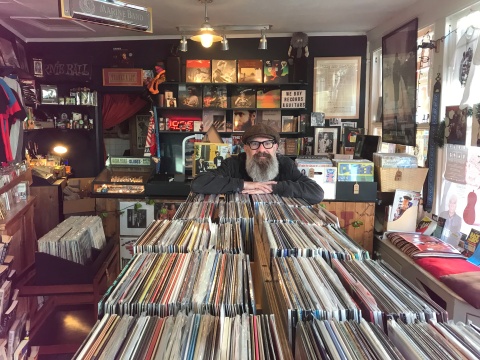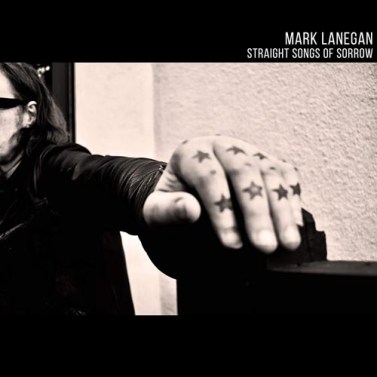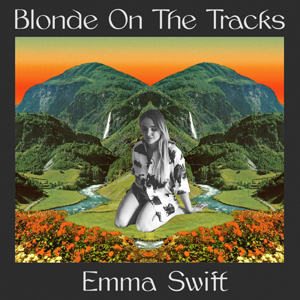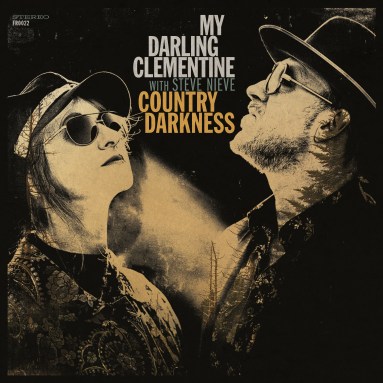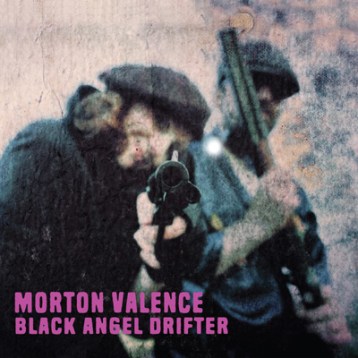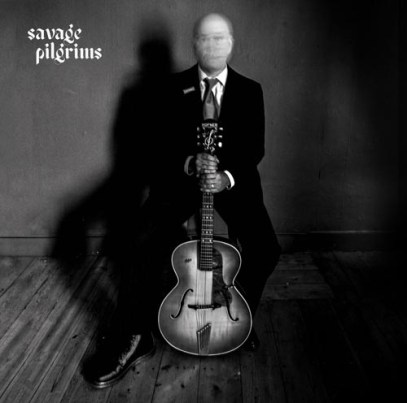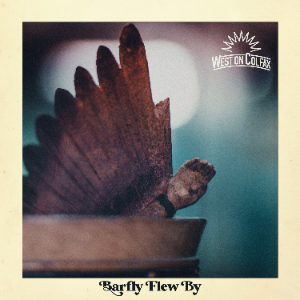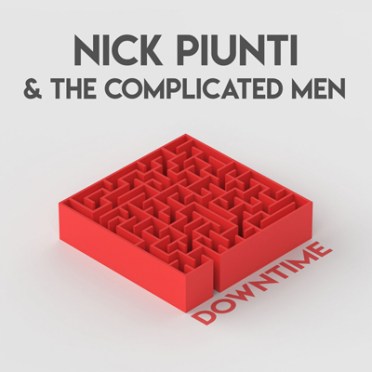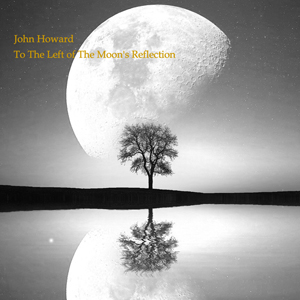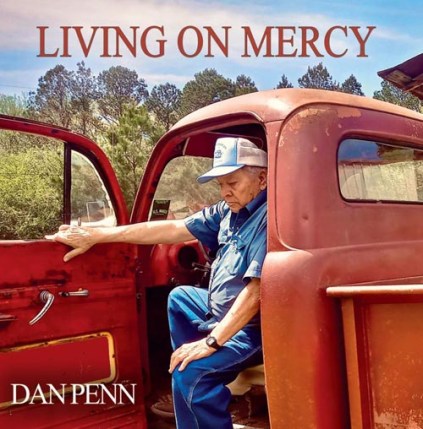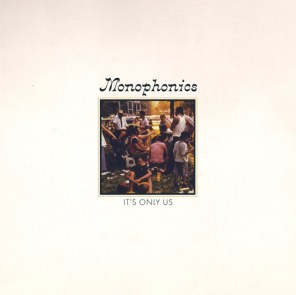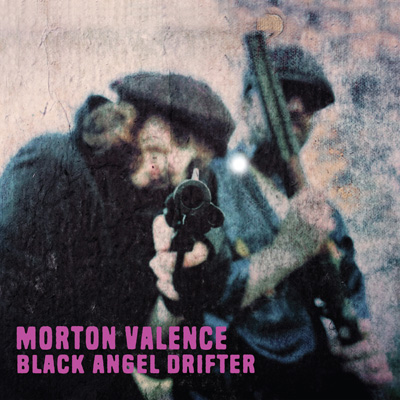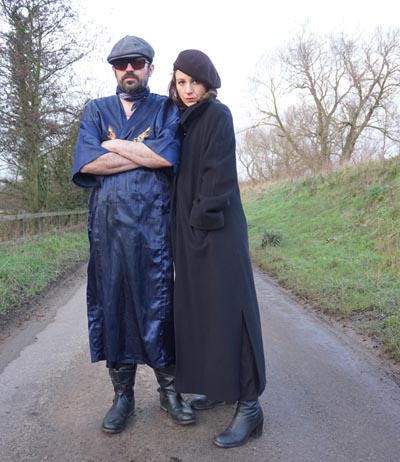This year will go down in history because of the devastating effects of the Covid-19 crisis on society, but here at Say It With Garage Flowers we’re hoping it will also be remembered for a more positive reason – the sheer amount of great music it produced.
When the global live music scene had to be put on hold due to the virus, artists had to look at other ways to get themselves heard, such as holding online concerts, or streaming performances.
‘This year, Say It With Garage Flowers’s ‘Best Of’ list includes 65 albums, which is the largest amount we’ve featured in an end of the year round-up since we first started publishing more than 10 years ago’
One of the few positive things to emerge from the pandemic was that musicians had more time to concentrate on recording or finishing off albums in their home studios, so it meant that there was a glut of new material out there that we could enjoy while we were in lockdown.
This year, Say It With Garage Flowers’s ‘Best Of’ list includes 65 albums, which is the largest amount we’ve featured in an end of the year round-up since we first started publishing more than 10 years ago. I’ve written in depth about several of the albums, but not all of them (!) and have included a Spotify playlist to go with this year’s selection. Are you ready? Here we go…
Straight Songs of Sorrow by Mark Lanegan was our favourite album of 2020. The twelfth solo record by gravel-voiced grunge survivor Lanegan (Screaming Trees, Queens of the Stone Age) was inspired by him writing his autobiography, Sing Backwards and Weep, which also came out this year.
The book, described by the publisher as ‘a brutal, nerve-shredding read, recounting his journey from his troubled youth in eastern Washington, through his drug-stained existence amid the ’90s Seattle rock scene to an unlikely salvation at the dawn of the 21st century’ was brilliant, yet deeply harrowing, and so was the album which accompanied it.
Talking about his autobiography and the album, Lanegan said: “Writing the book, I didn’t get catharsis – all I got was a Pandora’s Box full of pain and misery. I went way in and remembered shit I’d put away 20 years ago. But I started writing these songs the minute I was done, and I realised there was a depth of emotion because they were all linked to memories from the book. It was a relief to suddenly go back to music. Then I realised that was the gift of the book – these songs. I’m really proud of this record.”
And so he should be. Straight Songs of Sorrow is one of the best –and darkest – records Lanegan’s ever made. It’s a sprawling, 15-track masterpiece that takes in the folk and blues of his early solo recordings, as well as the electronic influences that have dominated his more recent releases. Like the book, the shadow of death hangs over these songs, and there’s plenty of drugs and [self] destruction thrown in for good measure too.
One of the songs is called Ketamine – although, amusingly, Lanegan admits that is actually one of the few narcotics he hasn’t taken… On the seven-minute epic Skeleton Key, over a moody, throbbing electronic bassline and synthesised strings, he sings: “I spent my life trying every way to die – is it my fate to be the last one standing?”

Similarly, on Hanging On (For DRC) – a pretty and delicate acoustic ballad that’s dedicated to his friend Dylan Carlson, from drone doom group Earth, who, like Lanegan, is also a survivor of the Seattle rock and roll scene, he tells us: “By all rights we should be gone, but you and me are still hanging on.”
‘Straight Songs of Sorrow is one of the best – and darkest – records Lanegan’s ever made. It’s a sprawling, 15-track masterpiece that takes in the folk and blues of his early solo recordings, as well as the electronic influences that have dominated his more recent releases’
Ballad Of A Dying Rover is very uncomfortable – a suffocating, electro-goth dirge with Led Zeppelin’s John Paul Jones providing some eerie Mellotron. “Death is my due’ – I’m just a sick, sick man… my days are numbered,” laments Lanegan.
With its fingerpicking and mournful strings, Stockholm City Blues is stunning. A haunting ballad about heroin addiction – “I pay for this pain I put into my blood” – it sees him staring out of a hotel window in the rain-soaked Swedish capital city, full of remorse.
His wife, Shelley Brien plays Nancy Sinatra to his Lee Hazlewood on the duet This Game Of Love – it recalls Lanegan’s collaborations with Isobel Campbell, but with an electronic edge – while on At Zero Below, he ropes in The Bad Seeds’ Warren Ellis to play some sinister country fiddle – backing vocals are courtesy of Greg Dulli (Afghan Whigs), who was Lanegan’s partner in crime in the Gutter Twins side-project. Thanks to its electronic sounds and skittering beats, Internal Hourglass Discussion brings to mind late-period Radiohead, or Thom Yorke’s solo material – Lanegan’s current favourite instrument to compose on is a miniature computer-synth called an Organelle.
Portishead’s Adrian Utley provides atmospherics on Daylight In The Nocturnal House – adding some echo-laden, twangy and bluesy guitar to a horror-folk ballad, which also features mandolin. Jack Bates, son of Peter Hook (Joy Division, New Order), plays bass on Churchbells, Ghosts – a hypnotic, ambient soundtrack for a gruelling life spent on a tour bus.
Thankfully, there is some light at the end of the tunnel. On the final song, the hopeful and spiritual-like Eden Lost and Found, with gospel organ, Lanegan says: “Sunrise coming up baby – to burn the dirt right off of me.” After accompanying him on his harrowing and emotionally draining journey, it feels good to finally emerge from the darkness. How about adopting it as an anthem for a post-coronavirus world?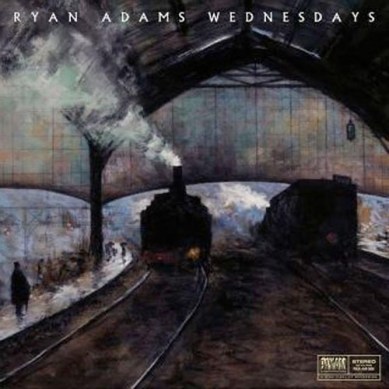
Darkness also features heavily on one of our other favourite albums of this year, Wednesdays by Ryan Adams, who is also no stranger to the art of self-destruction.
A surprise release – it’s currently only available on streaming and download services, but CD and vinyl are due in March 2021 – it was understandably overshadowed by the allegations of emotional and sexual abuse which first emerged against Adams last year, but, ironically, it’s the best record he’s made in 20 years, although many media outlets have chosen to completely ignore it.
Wednesdays was essentially the album I’d been waiting for Adams to make since his 2000 solo debut, Heartbreaker – a return to his country roots, rather than the disappointing soft rock that’s he churned out over the past few years.
‘The release of Wednesdays by Ryan Adams was understandably overshadowed by the allegations of emotional and sexual abuse which first emerged against him last year, but, ironically, it’s the best record he’s made in 20 years, although many media outlets have chosen to completely ignore it’
A sad, mostly-stripped down record, it opens with the stunning and beautiful I’m Sorry and I Love You, which, with its falsetto vocals, piano and sweet strings sounds like vintage ’70s Neil Young. A classic breakup song, equally, it could also address the recent issues that have blighted Adams’s career and seen many people turn their backs on him – tellingly, in the opening lines, he sings: “I remember you before you hated me, before you traded me for someone new.”
There’s some lovely, Nick Drake-style acoustic guitar picking on the gorgeous and folky Who Is Going To Love Me Now, If Not You – once again, that title speaks volumes – and So, Anyways has some haunting, wailing harmonica that recalls Come Pick Me Up from Heartbreaker, my favourite song by Adams.
On the superb and anthemic country rock of Birmingham, which is the album’s most upbeat moment – and arguably its best song – there’s some great organ playing by Benmont Tench (Tom Petty and The Heartbreakers), which gives the song a serious swagger. If you can separate the art from the artist, which I can, Wednesdays is a truly rewarding listen.
And, on a similar note, the ever-controversial Morrissey released a strong collection of songs in 2020. I Am Not A Dog On A Chain, his thirteenth studio album, included several late career highlights, such as the dramatic and sardonic opener Jim Jim Falls, which starts with an explosive eruption of ’90s rave-like synths, and has him crooning “If you’re going to kill yourself now, then to save face, get on with it” to someone who is looking to commit suicide by throwing themselves off a waterfall in Australia. Classic Mozzer.
The jangly guitar pop of What Kind of People Live In These Houses? was laugh-out-loud funny “What kind of people live in these houses?T-shirts or blouses? Torn jeans or proper trousers” – and brought to mind Girlfriend In A Coma-era Smiths, while first single, Bobby Don’t You Think They Know? was a powerful and unusual duet with soul/ disco diva Thelma Houston, and had a crazy, ’60s-style psychedelic organ solo and skronking sax. Stop me, but we hadn’t heard Morrissey like this before…
Say It With Garage Flowers favourites The Hanging Stars released their third and best album this year, A New Kind of Sky. The London band’s cosmic country songs and shimmering psychedelic sounds owe a large debt to The Byrds, The Flying Burrito Brothers, Bert Jansch and Fred Neil, as well as Spaghetti Western soundtracks.
The bulk of A New Kind Of Sky was recorded live at Echozoo studio in the Sussex seaside town of Eastbourne. The sessions were produced by Dave Lynch and took place shortly after The Hanging Stars had returned from a tour of Germany – Lynch really captured the energy of the band.
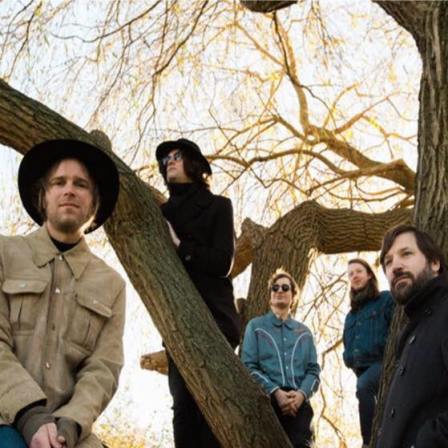
Speaking to me earlier this year for an interview with consumer magazine Hi-Fi+, Sam Ferman,bassist with the band, said: “When we started The Hanging Stars, we had a definite idea of what we wanted our first record to be like – cosmic, psychedelic, spacey country music.
“With our second album, other influences came in and it was a bit of a transitional period, as our original keyboardist and pedal steel player had both left. I love the last record for its variety.”
He added: “The new one could’ve been a completely different album – we talked about what type of band we were and what the core of the record should be. There was the potential for it to be more of an acoustic country rock album. When we did the recording sessions in Echozoo, we’d just come back from a tour of Germany – we were playing the new songs in our set and by the last date of the tour something magical happened, because we were so synced-in with playing with each other. We wanted to capture that energy from the tour, so we recorded most of the songs live at Echozoo in three days, playing as a full band.”
‘The Hanging Stars released their third and best album this year, A New Kind of Sky. The London band’s cosmic country songs and shimmering psychedelic sounds owe a large debt to The Byrds, The Flying Burrito Brothers, Bert Jansch and Fred Neil, as well as Spaghetti Western soundtracks’
As I wrote in Hi-Fi+, there are several cinematic songs on the album. Three Rolling Hills has Mariachi horns and a Spaghetti Western vibe; the trippy Lonely Rivers has an electric piano-led groove and echoes of Pink Floyd, while the spiritual and hymn-like I Was A Stone opens with a church organ and has a brass arrangement reminiscent of a New Orleans funeral.
I Will Please You is a catchy, glam-rock-tinged sing-along; the stripped-down, acoustic ballad Song For Fred Neil is a paean to the ‘60s and early ‘70s singer-songwriter; Heavy Blue is classic-sounding country rock and first single, (I’ve Seen) The Summer In Her Eyes is pastoral, Byrdsian jangle-pop. The band are currently working on their fourth album – I can’t wait to see which direction it will take them in.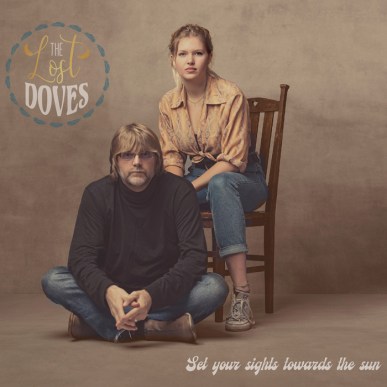
Duo The Lost Doves – North West-based singer-songwriters Ian Bailey and Charlotte Newman – are also no strangers to retro jangle pop. Their debut album, Set Your Sights Towards The Sun, was in thrall to The Byrds and The Beatles, as well as vintage psychedelic sounds. On the optimistic and anthemic title track, Bailey’s 12-string Rickenbacker rings out like bells (of Rhymney), and it also adds a gorgeous shimmer to the melancholy She’s Waking Up To Close Her Eyes.
There’s a country tinge to the beautiful, acoustic ballad You Stop Me From Falling, a Lennon feel to the haunting Sally Weather, a hint of Eastern mysticism on More Than I and some seriously heavy psych on the dark, trippy instrumental, The Clowns Are Coming To Town.
“I wanted the album to feel like a record you’ve had in your collection for years – warm, inviting and in the vein of the classic West Coast sound of the ‘60s,” Bailey told us, in an exclusive interview. He certainly achieved his goal… Check out his latest release, an EP co-written with former Cosmic Rough Rider, Daniel Wylie, here.
This year was a great one for releases by singer-songwriters. The daddy of them all, Bob Dylan, put out Rough and Rowdy Ways, which was his best album since 1997’s Time Out of Mind. Preceded by the surprise single, Murder Most Foul, a wry, moving and masterful 17-minute epic about the assassination of JFK and its part in political and cultural history, Rough and Rowdy Ways was at times stripped-down and delicate, but also raw and bluesy, however, it was always cryptic and fascinating – an essential listen.
On her album of Dylan cover versions, the wonderfully titled Blonde On The Tracks, Australian-born, Nashville-based singer-songwriter Emma Swift included her take on I Contain Multitudes, from Rough and Rowdy Ways. A reflective and stately ballad, her achingly beautiful voice is accompanied by acoustic guitar and minimal instrumentation.
Blonde On The Tracks is one of the best covers records I’ve ever heard. Swift puts her own [simple] twist on some of her favourite Dylan songs, but, unlike some artists who’ve covered his work, she remains reasonably faithful to the original versions, rather than radically overhaul them.
“Interpreting other people’s emotions is how I learned to sing and I’ve always enjoyed hearing Dylan’s songs from a female perspective,” she says. “You can learn a lot about melody and feeling by the way a singer chooses to interpret someone else’s song. You can learn a lot about words by singing someone else’s. I’m very influenced by singers like Sandy Denny, Joan Baez, Billie Holiday and Sinead O’Connor. There’s an art to interpretation.”
‘Blonde On The Tracks is one of the best covers records I’ve ever heard. Emma Swift puts her own [simple] twist on some of her favourite Dylan songs, but remains reasonably faithful to the original versions, rather than radically overhaul them’
Produced by Patrick Sansone, multi-instrumentalist from Chicago alt-rockers Wilco, Blonde On The Tracks sounds intimate, warm and inviting – Swift’s voice is gorgeous and breathy. The eight-track album opens with Queen Jane Approximately – in a nice touch, Swift gives it a wonderful, Byrds-style makeover, with chiming 12-string guitar.
She slows down One of Must Know (Sooner or Later), turning it into a pleading, haunting, late-night country song, with pedal steel. Simple Twist of Fate gets a similar treatment, but with some understated, twangy guitar licks, as does the 12-minute epic Sad Eyed Lady of the Lowlands.
The album features guest appearances from Sansone, singer-songwriter – and Dylanologist – Robyn Hitchcock, who plays guitar, Thayer Serrano (pedal steel) and Steelism’s Jon Estes and Jon Radford on bass and drums, respectively.
Another great covers album from this year was Country Darkness by British husband-and-wife country music duo My Darling Clementine – Michael Weston King and Lou Dalgleish – and Elvis Costello’s keyboardist and right-hand man Steve Nieve (The Imposters/ The Attractions).
The record, which also featured members of Sheffield crooner Richard Hawley’s band, was a collection of reinterpretations of some of Costello’s country and country-soul songs. For their choice of covers, My Darling Clementine didn’t go down an obvious path. Indoor Fireworks, which they slowed down and turned into a smouldering, piano-led ballad, was arguably the most well-known Costello track on the record – it’s from his 1986 album King of America.
Elsewhere they resurrected some of his more obscure offerings, such as the Paul McCartney co-write That Day Is Done, which had a gospel and New Orleans funeral feel, thanks to the brass arrangement, and the melancholy Heart Shaped Bruise, which was a collaboration between Costello and Emmylou Harris. My Darling Clementine’s version was stripped-down, emotional and dramatic, with Nieve on piano.
Stranger In The House, a song Costello recorded as a duet with country music star George Jones, was reinvented as a rumba, while Different Finger, a tale of infidelity from Costello’s album Trust, was given a Marty Robbins, Tex-Mex treatment, with some great accordion and gorgeous, Spanish-style guitar.
The Crooked Line was the most upbeat track on the record, powered by some groovy organ from Nieve, while penultimate song, the haunting, sombre and atmospheric Too Soon To Know, was the very essence of ‘country darkness’. Majestic, country-soul closer Powerless – a My Darling Clementine original – was easily up there with the best of Costello.
Speaking to Say It With Garage Flowers about the album, Weston King said: “We had a long list of songs to choose from – some got the chop because we felt they’d been done quite a lot before, or because, lyrically, they didn’t translate so well into being done by a duo. I also didn’t want our record to be totally country – I wanted a country soul vibe.”
My Darling Clementine weren’t the only male/female due to explore country darkness this year. Black Angel Drifter, the seventh album by Spain and London-based ‘urban country’ duo Morton Valence – songwriter, producer and multi-instrumentalist Robert ‘Hacker’ Jessett (ex-member of The Band of Holy Joy and Alabama 3) – and Anne Gilpin, was a dark, disturbing and dissonant collection of ‘gothic country’ songs, inspired by the haunting cowboy psychedelia of Nancy Sinatra and Lee Hazlewood, murder ballads, country, and the Spaghetti Western soundtracks of Ennio Morricone, as well as the strung-out, feedback-laced, narcotic blues of Spiritualized.
The record also included a stunning cover version of Bob Dylan’s dramatic The Man In The Long Black Coat, which was even more sinister than the original.
Telling Say It With Garage Flowers about how and why they tackled the Dylan song, Jessett said: “It’s a work of genius; it’s country gothic heaven and hell, and it kind of set a ridiculously high standard for what we were trying to do on this album. Taking on something of such magnitude is living dangerously, not least as Mark Lanegan does a killer version of it too.
“I guess when you cover a song, you want to leave your own mark on it, and hopefully we at least achieved that – most likely much to the horror of some Dylan purists. Having a male/female vocal takes it somewhere different, plus I spent a long time getting the discordant guitars the way we wanted them to sound.”
From The Man In The Long Black Coat to The Man In Black… Johnny Cash was just one of the characters who found themselves mentioned on Matt Hill’s album, Savage Pilgrims – a collection of story / character songs told by different narrators. It was the first album Hill put out under his own name, rather than the Quiet Loner moniker which his previous four records have been credited to.
Fittingly, it was album that saw him returning to his roots – some of the songs, like the folky Bendigo, which was the tale of a celebrated prizefighter, and the country-blues of Four Corners, were set in Nottinghamshire, which is where he grew up. Hill was born and raised in the mining town of Eastwood – the hometown of DH Lawrence. The novelist and poet actually features in one of the songs on the album, the haunting and moody, Spaghetti Western-flavoured The Exile of DH Lawrence, although it concerns itself with the last few years of the protagonist’s life, spent wandering the deserts of New Mexico, stricken with TB.
The album’s title, Savage Pilgrims, comes from a phrase Lawrence used to describe his time in voluntary exile – he called it his “savage pilgrimage.”
Hill describes the album as “Americana rooted in British history and his own upbringing in a working class culture obsessed with America.” Savage Pilgrims is also a rootsy album musically – it’s influenced by country/Americana, folk, blues, spirituals and gospel.
‘Hill wanted the listener to feel like they were in the room, sat next to the storyteller, with people playing instruments all around them, so the performances were recorded live to analogue tape, using vintage microphones and with minimal overdubs’
It was recorded with producer/collaborator Sam Lench in an attic studio above a 19th century pub in Northern England, where George Orwell used to drink – The King’s Arm, in Salford. Hill and Lench wanted the listener to feel like they were in the room, sat next to the storyteller, with people playing instruments all around them, so the performances were recorded live to analogue tape, using vintage microphones and with minimal overdubs.
This made for a great and interesting sounding record – intimate and immersive, but rhythmic, raw and rough around the edges. Hill’s vocals take centrestage – it’s like he’s singing in your ear – accompanied by traditional folk or Americana instruments, including acoustic and electric guitars, (James Youngjohns and Lench), double bass, banjo, mandolin and percussion.
Hill resurrected one of his old songs, Get Me Johnny Cash On The Phone, for the album, but with a new title Gary Gilmore’s Last Request. It’s a country song about a convicted murderer on death row getting a phone call from his hero, the Man In Black.
Talking to me for the website Americana UK, Hill said of his latest record: ” I’m really proud of this album and especially of how it sounds. I think it’s the best thing I’ve done. As a solo acoustic singer-songwriter, there is always a dilemma involved when making an album. I didn’t want it to be a full-on production that I could never replicate live. But, equally, a simple solo acoustic record can often sound a little thin, so I tried to go somewhere in the middle.”

He added: “My role was to rehearse like mad and to turn up knowing those songs inside out. The rest was down to Sam’s production skills. We both really enjoyed the process too, so hopefully that comes over. The most important part was in capturing the core live performance of me singing and playing exactly as you would see at a gig. Once we had those performances, we built everything else around it. The King’s Arms was a great place to record, with atmosphere and history, so that really helped make it feel special as we were making it.”
A band I discovered in 2020 via a connection between one of its members – bassist Scott Carey – and Hill was UK Americana act West On Colfax, from Preston, Lancashire.
Their debut single, Choke Hold, was influenced by Teenage Fanclub, Big Star, Wilco and Son Volt. Say It With Garage Flowers described it as: “Two and a half minutes of life-affirming guitar pop that sounds like a long-lost Creation Records release from the early ’90s. They may hail from Lancashire, but you’d be forgiven for thinking that West on Colfax grew up on a Glaswegian council estate, reared on a diet of Irn-Bru and Byrds records.”
The band’s album, Barfly Flew By, was one of my favourite records of 2020. From the ’70s Rolling Stones country feel of The Line, with its bluesy guitar licks and warm Hammond organ, to the late-night barroom romance of Cowgirl of the County (“She was the cowgirl of the county – she leant into me gently. We chose the songs on the jukebox – I don’t think I’ve been as happy”), the twangy Tinsel Heart, the rough and ready, battered and beaten-up road trip of Tyre Marks (“The tyre marks you left across my heart are all that’s now left…”) and the world-weary, yet, ultimately, optimistic, electric piano-led ballad, Light Again, which closes the album, it was clear West on Colfax wear their classic country, rock ‘n’ roll and Americana influences on the sleeves of their well-worn plaid shirts. These were songs that were best listened to while staring at the bottom of your glass, but they also had a reassuring warmth to them. The band describe their music as, ‘tales of love, life and hard-lived lives but with hope.’

Classic rock ‘n’ roll influences were also all over Circles – the second album by New York-based singer-songwriter Jake Winstrom. This time around, the former frontman of Tennessee band Tenderhooks cranked up the guitars and also embraced his love of power-pop and country rock.
Speaking to Say It With Garage Flowers, he said: “I think my first solo record [Scared Away The Song] suffered a bit from the inclusion of maybe one too many “serious songwriter” type songs, without enough fun, uptempo, jangly rock ‘n’roll to serve as a counterbalance, so I wanted to make sure there was room for that on this record.”
He certainly achieved his goal – the brilliant What’s The Over/Under? was an infectious power-pop song with jangly, 12-string Rickenbacker guitars and punchy, soulful horns, while on the chugging glam-rock-country-boogie of Come To Texas She Said, which was inspired by a long-distance infatuation that derailed before it could become something more, reedy-voiced Winstrom did his best Marc Bolan impression.
‘Classic rock ‘n’ roll influences were also all over Circles – the second album by New York-based singer-songwriter Jake Winstrom. This time around, the former frontman of Tennessee band Tenderhooks cranked up the guitars and also embraced his love of power-pop and country rock’
Circles was full of highly melodic, guitar-heavy tunes with a retro feel – Winstrom cites ’70s Neil Young and Crazy Horse as a major influence, which is obvious if you listen to the Zuma-style guitar solo on My Hiding Place, a song about addiction, and the brooding, epic album closer, Kilimanjaro.
Tom Petty and Bruce Springsteen are also artists that Winstrom admires – his song Washed My Face In A Truck Stop Mirror, a raucous blast of rock ‘n’ roll, had echoes of both of them – while Think Too Hard was reminiscent of The Beatles, circa Revolver, as well as Detroit power-pop songwriter – and Say It With Garage Flowers favourite – Nick Piunti.
Funnily enough, Piunti also released a great album in 2020, which a title that was very apt for these days of global lockdown – it was called Downtime.
Talking to Say It With Garage Flowers about the name of the record, he said: “It’s a bit too timely. My daughter, Megan, actually came up with it after listening to the album. In the song Never Belonged To Me there’s a lyric that says: “Don’t know what to do with the downtime.”
“The word ‘time’ also shows up in a few of the other songs,” said Piunti, whose latest record – his sixth – was the first with his new band, The Complicated Men.
The album had all the usual Piunti hallmarks – raw vocals, infectious melodies, crunching guitar riffs and sweet, ’60s-style harmonies – but, this time around, the sound was fleshed out with Hammond organ.
First single, All This Time, was anthemic and urgent indie rock ‘n’ roll, the opening track, Upper Hand, chugging and New Wavey, and Going Nowhere had some breezy ‘doo-doo-doo’ backing vocals and a killer, fuzzed-up, melodic guitar solo. There were also some quieter and more reflective moments – the ballads All Over Again and Good Intentions.
English singer-songwriter and pianist, John Howard released his seventeenth album in 2020. To The Left of the Moon’s Reflection was a set of wistful, reflective and pastoral, piano-led ballads, chamber pop and folk songs, with sparse percussion and layered, atmospheric arrangements and harmonies. Howard sang lead and backing vocals and played all the instruments.
To The Left of The Moon’s Reflection was written and recorded in his home studio – he lives in a 100-year old cottage in the Murcia region of southern Spain – during the winter of 2019 and spring 2020. Talking to me about the album, Howard said: “It does have a pastoral theme, definitely. My surroundings and the simple, rural way of life here are certainly reflected in a lot of the songs. My city days are over.”
He added: “It became very clear early on that there was a wistfulness about the new songs – a reflective quality – so that drove the arrangements.”
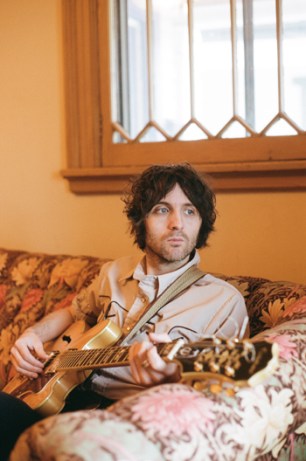
When the coronavirus pandemic forced Canadian singer-songwriter Jerry Leger to cancel his European and UK spring tour, he turned a negative situation into a positive one by hastily putting together a brand new, digital-only album called Songs From The Apartment.
Available to buy from Bandcamp, it was made up of ‘lost’ songs from 2013- 2018 that he’d demoed and quickly forgotten about.
It was a brilliant collection of intimate Americana and Dylanesque folk-blues tracks.
The loose, raw and lo-fi recordings really hung together well as an album, and, if anything, it demonstrated that Leger’s discarded songs were better than many artists’ officially released ones.
Telling Say It With Garage Flowers about putting the tracks for Songs From The Apartment together, Leger said: “They were recorded in my apartment on just a little recorder with an internal microphone. Very rough. They were all songs that were demoed and either not chosen to go into the studio with, or tried in the studio but left off the albums.
“Basically before making an album I probably would have 30 or so songs and we’d pick 15-18 to go into the studio with and then 10 or 12 would make the cut. Some really great ones are never returned to after the initial demo and that’s because they may not fit the feel I’m going for at the time, or it’s a similar idea or sound to a different song that I prefer. For example we recorded Tomorrow In My Mind and Ticket Bought for Time Out For Tomorrow [2019 album] and I felt they both had a similar feel, so I decided on the former.”
Leger is looking to put out a limited edition vinyl version of Songs From The Apartment in 2021. He is also a fan of an artist who appears on my ‘Best of 2020’ list – legendary Southern soul singer, songwriter, musician and record producer, Dan Penn, who I was lucky enough to interview for Hi-Fi+magazine this year.
In the ‘60s, Penn, who is 78, co-wrote massive soul hits including The Dark End of the Street, Do Right Woman, I’m Your Puppet, Cry Like A Baby and It Tears Me Up. His songs have been sung by the likes of Aretha Franklin, Otis Redding, Percy Sledge, Janis Joplin, Solomon Burke, Elton John, James Carr, Bobby Womack and Diana Ross.
This year saw him releasing his new album, Living On Mercy, which was a collection of songs written with collaborators including his long-term musical partner, Spooner Oldham, as well as fellow songwriting masters Wayne Carson (Always On My Mind), Gary Nicholson, Carson Whitsett, Will McFarlane, Bucky Lindsey, Buzz Cason and the Cate Brothers.
For the most part, Living On Mercy had a reassuring, warm, slick and smooth country soul sound, like the gorgeous, Hammond organ-led title track, which was about the intoxicating effects of falling in love, the tight and funky groove of Soul Connection, and the sad Blue Motel, which, rather neatly, namechecked one of Penn’s most famous songs, The Dark End of the Street, in the lyric.
Elsewhere on the record, Edge Of Love was a heavy, bluesy rocker with horn blasts, and One Of These Days, the final song, was a moving, reflective gospel ballad about changing your ways before it’s too late and you’ve gone to the great songwriting gig in the sky.
Living On Mercy was Penn’s first studio album in nearly 30 years – his last one, Do Right Man, was released in 1994. When I asked him about the warm sound of the record, he told me: “I tried my best do to that and it’s what makes it different I guess, because there ain’t a lot of warmth out there these days.”
‘Living On Mercy had a reassuring, warm, slick and smooth country soul sound, like the gorgeous, Hammond organ-led title track, which was about the intoxicating effects of falling in love, the tight and funky groove of Soul Connection, and the sad Blue Motel, which, rather neatly, namechecked one of Penn’s most famous songs, The Dark End of the Street’
He added: “I cut the first bunch of six songs in Creative Workshop, Nashville – it’s my friend Buzz Cason’s studio. I liked what we got – I had a fantastic band. I tried to get things back together in Nashville a month or so later, but it didn’t work out, so I finally figured it out in Sheffield, Alabama and we cut seven songs there. It was a fun record to make – everybody was loose. The album was a little troublesome to mix, but they all are.”
Soulful, warm sounds were also the order of the day on Humanism, the third record in a trilogy by Monks Road Social, a collaborative project overseen by Dr. Robert of The Blow Monkeys.
Recorded in Spain last summer, the album was a colourful collection of jazzy, folky and soulful songs, featuring an impressive list of guests, including Matt Deighton (Mother Earth), Mick Talbot (The Style Council), Sulene Fleming (Brand New Heavies) and actor Peter Capaldi. Humanism was the perfect record to listen to transport your mind somewhere else during these anxiety-ridden days of lockdown.
Fleming belts out the frenetic, jazz-funk of Said Too Much and duets with Dr. Robert on the smooth, orchestral soul of Step By Step, while Capaldi sings and plays guitar on the anthemic Britrock of first single, If I Could Pray, which he also wrote.
Keyboardist Mick Talbot of The Style Council and Matt Deighton, guitarist and frontman of ‘90s acid-jazz outfit Mother Earth, who’s played with Paul Weller and Oasis, also made the trip to Spain. Deighton sang on the warm, folky and pastoral ballad Apricot Glow and shared vocals with Dr. Robert on the gorgeous, acoustic, string-laden Egyptian Magic – both tracks feature Talbot on organ. Deighton’s daughter, Romy, lent her vocals to two songs – Stolen Road and Running Blind.
Also on the album were drummer Crispin Taylor and bassist Ernie McKone – both of whom played with acid-jazzers Galliano; percussionist and programmer Steve Sidelnyk; flautist and saxophonist Jacko Peake (Push) and Neil Jones of Midlands mod-soul band Stone Foundation.
The Spanish sunshine worked its magic, as there was a distinctly Flamenco feel to some of the songs on the record. In an interview with Say It With Garage Flowers, Dr Robert said of the album: “It was recorded over about 10 days in the summer last year – August, to be precise. It was very hot – the wind blew in from Africa.
‘Recorded in Spain last summer,Humanism by Monks Road Social was a colourful collection of jazzy, folky and soulful songs -the perfect record to listen to transport your mind somewhere else during these anxiety-ridden days of lockdown’
“My friend, the producer Youth, has a studio out here, so we did it there. I produced the record, but with so many friends involved it’s never stressful – people like Crispin Taylor and Mick Talbot don’t really need producing. We communicate with a look these days.”
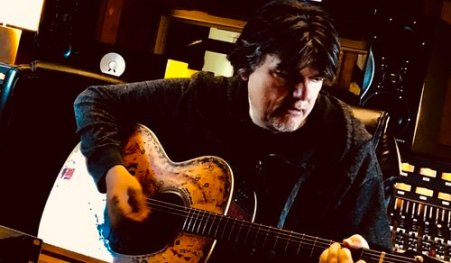
On the sound of the album, he said: “The fact that it was super-hot and we were here in Granada obviously flowed into the music. Plus we had a few local musicians involved: David Heredia, the amazing gypsy Flamenco guitar player, and Juan Carlos Camacho on trumpet. Also Ibrahim Diakité from Mali played the kamalengoni. Some of the best stuff was after the session, when we were just jamming. It was an unbelievable vibe.”
For more soulful sounds, try It’s Only Us, the latest album by San Francisco-based psychedelic-soul band Monophonics. Heavily influenced by Curtis Mayfield, Isaac Hayes and Marvin Gaye, it’s a sociopolitical record that tackles subjects including violence and gun crime and mental health issues, as well as good, old fashioned affairs of the heart.
Recorded on eight-track reel-to-reel tape in the group’s Transistor Sound Studio in Marin County, it’s lush and sweet, but also dark, cinematic and edgy. First single Chances is funky, up-tempo Northern Soul, Last One Standing is an epic floor-filler in the vein of Mayfield’s Move On Up, while tracks like Suffocating and Run For Your Life were inspired by the band’s love of ‘60s psych-rock.
I interviewed lead singer Kelly Finnigan, who co-wrote, produced, recorded and mixed the album, for Hi-Fi+ magazine. He told me: “We like our sound to be warm, raw, gritty and fat, but inviting. It was a very organic and spontaneous process. We definitely had a vision from the start, but we still like to let things happen naturally and go with the flow of where the music and mood takes us.
‘It’s Only Us, the latest album by San Francisco-based psychedelic-soul band Monophonics, was heavily influenced by Curtis Mayfield, Isaac Hayes and Marvin Gaye. It’s a sociopolitical record that tackles subjects including violence and gun crime and mental health issues, as well as good, old fashioned affairs of the heart’
“We had ideas about what we wanted, but we are never married to things so much that it clouds our vision and causes us to be compulsive about what the end result is. It was influenced by love, loss, violence, heartbreak, the power struggle of our industry, personal relationships and the overall trip of life as a human living in the current world.

“Musically it’s influenced by great artists from the past like Curtis Mayfield, Rotary Connection, Brothers of Soul, Isaac Hayes, Vanilla Fudge, Pink Floyd, The Zombies and current artists like Michael Kiwanuka, Kevin Parker and Richard Swift. Our taste in music is very eclectic and we like all types of styles and genres. A lot of the band are into classic soul, but we all love psychedelic music, whether it’s The Beatles, David Axelrod, Norman Whitfield, Charles Stepney or Tame Impala.”
Classic retro influences are also integral to the sound of The Explorers Club, who released two albums this year – a self-titled album and To Sing And Be Born Again, a 10-track collection of covers of songs from 1965-68 that were originally performed by artists including The Zombies, Paul Revere & The Raiders, Herb Alpert, Frankie Valli and The Lovin’ Spoonful.
During the first Covid-19 lockdown, one of the albums that kept me sane was The Explorers Club. Paying homage to the lush orchestrations of Phil Spector and Burt Bacharach, as well as the ‘60s sunshine pop of The Beach Boys – circa Pet Sounds – The Turtles and The Association, it was an ambitious collection of songs, with gorgeous, aching melodies and wonderful, rich arrangements for strings, horns and vocals.
The bouncy, harmony-drenched first single Ruby could be the sister of Elenore by The Turtles, Mystery, Don’t Cry and Look To The Horizon are perfect pocket symphonies, Dawn has a bossa nova feel, the guitar-led Say You Will is infectious, driving beat-pop, and Somewhere Else – the heaviest moment on the album – is far out and groovy, Byrds-like psychedelia. It’s hard to believe these songs haven’t been around for years – they sound like long-lost classics.
‘During the first Covid-19 lockdown, one of the albums that kept me sane was The Explorers Club. Paying homage to the lush orchestrations of Phil Spector and Burt Bacharach, as well as the ‘60s sunshine pop of The Beach Boys, The Turtles and The Association, it was an ambitious collection of songs, with gorgeous, aching melodies and wonderful, rich arrangements for strings, horns and vocals’
In these dark times we’re living in, the record is a perfect summer soundtrack that will take you away to a different place – specifically the West Coast of America, in the mid to late ‘60s.

Speaking to me for Hi-Fi+ magazine, Jason Brewer, the mastermind behind The Explorers Club, who founded the US band in his native Charleston, South Carolina, before relocating to Nashville, said: “I have this vision of creating classic sounds that send people on a musical vacation. I’m inspired by classic records made by The Wrecking Crew [famous, LA-based, ‘60s and ‘70s session musicians], as well as vintage movies with dreamy scores and soundtracks. I’m always aiming to take the listener away from modern constraints to a place where the melody and sound just take over.”
My favourite song on The Explorers Club is the last track, Look To The Horizon, which seems like a fitting way to finish an article that’s published at the end of the year. Here’s hoping that we can look forward to yet another year of great music in 2021 and, more importantly, an end to these worrying times we’ve been living through during the past 12 months.
In the meantime, here’s my list of the Best Albums of 2020 – I didn’t include stopgap live albums, like Nick Cave’s Idiot Prayer and Vinny Peculiar’s Loot, although I enjoyed those records – and a Spotify playlist to accompany it. Please note, not all the albums I’ve chosen are currently available to stream.
See you on the other side.
Say It With Garage Flowers: Best Albums of 2020
- Mark Lanegan – Straight Songs of Sorrow
- Ryan Adams – Wednesdays
- The Hanging Stars – A New Kind of Sky
- Bob Dylan – Rough and Rowdy Ways
- Emma Swift – Blonde On The Tracks
- Neil Young – Homegrown
- Matt Berninger – Serpentine Prison
- My Darling Clementine with Steve Nieve – Country Darkness
- Matt Hill – Savage Pilgrims
- Monophonics – It’s Only Us
- Doves – The Universal Want
- The Explorers Club – The Explorers Club
- Morrissey – I Am Not A Dog On A Chain
- Joe Pernice – Richard
- Jake Winstrom – Circles
- Morton Valence – Black Angel Drifter
- Mark Lanegan – Dark Mark Does Christmas
- Rose City Band – Summerlong
- Jerry Leger – Songs From The Apartment
- The Lost Doves – Set Your Sights Towards The Sun
- Futurebirds – Teamwork
- Paul Weller – On Sunset
- Humanist – Humanist
- West On Colfax – Bar Fly Flew By
- Reno Bo – You Can See It All From Here
- Arborist – A Northern View
- Ben Watt – Storm Damage
- Monks Road Social – Humanism
- The No Ones – The Great Lost No Ones Album
- Sunset Canyoneers – Sunset Canyoneers
- The Jayhawks – XOXO
- Jeff Tweedy – Love Is King
- Ryan Martin – Wandercease
- Eyelids – The Accidental Falls
- Nick Piunti & The Complicated Men – Downtime
- The Pretenders – Hate For Sale
- Isobel Campbell – There Is No Other
- Lawrence County – The Frailty of Humans
- Ren Harvieu – Revel In The Drama
- Dan Penn – Living On Mercy
- My Glass World – A Handbook of Roses
- The Flaming Lips – American Head
- Bruce Springsteen – Letter To You
- Elvis Costello – Hey Clockface
- Little Barrie & Malcolm Catto – Quatermass 7
- Calexico – Seasonal Shift
- Kelly Finnigan – A Joyful Sound
- John Howard – To The Left of The Moon’s Reflection
- Andy Bell – The View from Halfway Down
- Malojian – Humm
- Dropkick – The Scenic Route
- Jonathan Hultén – Chants From Another Place
- Andy Shauf – The Neon Skyline
- Mike Gale – Sunshine For The Mountain God
- Torn Sail – Leisure & Technology
- Mike Gale – The Star Spread Indefinite
- The Explorers Club – To Sing And Be Born Again
- The Mariners – The Tides of Time
- Sarah Vista – Songs of the Silver Screen
- Pete Greenwood & The Dark Stars – Radio Slow
- Richard Davies & The Dissidents – Human Traffic
- Luca Nieri – Always You
- The Sunchymes – The Sands of Time
- The Glorias – The Moral High Ground
- Groovy Uncle & Miss Modus – The Man Who Calls The Shots
